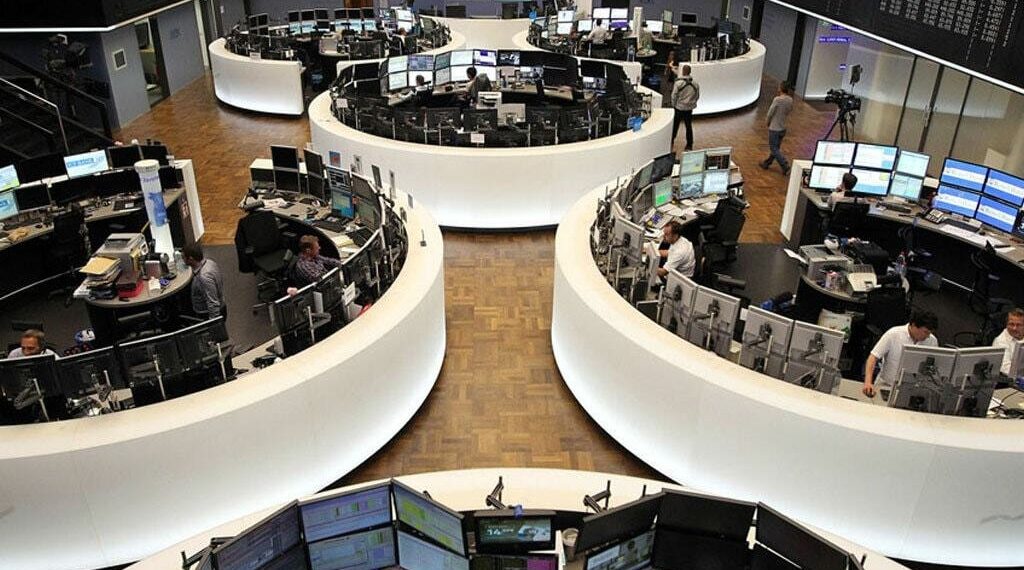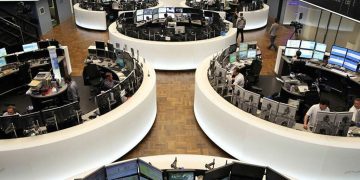London, United Kingdom — European shares opened mostly steady on Monday, following a sharp selloff at the end of last week. Investors returned cautiously after a volatile session that saw significant losses in major indices, reflecting concerns over global economic growth, rising interest rates, and ongoing geopolitical tensions. Despite the previous decline, early trading suggested that market participants were assessing company-specific earnings reports and macroeconomic data before committing to new positions.
Market Recap: Friday’s Selloff
On Friday, European stocks experienced widespread declines. The pan-European STOXX 600 index fell by 1.2%, dragged down by heavy losses in the technology, automotive, and banking sectors. Germany’s DAX dropped 1.5%, France’s CAC 40 slipped 1.3%, and the UK’s FTSE 100 lost 0.8%. Traders cited investor anxiety over rising borrowing costs, weak economic indicators, and uncertainty regarding energy prices.
“Friday’s selloff was driven by a combination of factors,” said Daniel Müller, a market strategist at a Frankfurt-based investment firm. “Investors are concerned about slowing growth in the eurozone, potential central bank tightening, and lingering geopolitical risks. Many chose to reduce risk exposure before the weekend.”
Volatility was particularly high in the technology sector. Shares of semiconductor companies and software firms in Europe declined sharply after weak earnings forecasts and cautious guidance from U.S. counterparts. Analysts noted that tech firms remain sensitive to global demand fluctuations and supply chain pressures.
Early Trading on Monday
On Monday, European markets opened on a steadier note, with most indices showing modest gains or holding steady. The STOXX 600 rose slightly by 0.2%, while Germany’s DAX and France’s CAC 40 inched up by 0.1% and 0.2% respectively. Traders appeared to be digesting economic data released over the weekend, as well as corporate earnings announcements scheduled for the week.
Investors seemed to adopt a wait-and-see approach, balancing concerns over central bank policy with optimism about ongoing corporate profitability. The FTSE 100 in London was relatively unchanged, reflecting mixed sentiment in the UK equity market amid ongoing debates over interest rates and inflation trends.
Sector-Specific Trends
Technology
Technology stocks continued to face pressure, but losses were contained compared to Friday. Semiconductor firms and hardware manufacturers experienced minor declines, as investors awaited updates on global chip demand. Software and IT service providers showed mixed performance, with some firms benefiting from contract wins while others struggled with weaker-than-expected guidance.
Banking and Financial Services
European banks exhibited cautious trading, reflecting investor concerns about interest rate policies and loan growth. Analysts highlighted that higher borrowing costs could affect credit demand, impacting bank revenues. Despite these worries, some lenders posted modest gains as they released better-than-expected quarterly earnings.
Energy and Commodities
Energy stocks rebounded slightly after last week’s volatility in oil and gas prices. Rising global demand, combined with supply concerns from key producing nations, supported crude oil futures. Companies engaged in renewable energy projects also showed small gains, as governments in Europe continue to focus on energy transition and sustainability initiatives.
Consumer Goods and Retail
The consumer sector remained steady, with retailers and luxury goods companies displaying mixed performance. European luxury brands benefited from resilient demand in Asia and the United States, while retailers faced cautious consumer spending trends in the eurozone. Analysts noted that upcoming holiday sales forecasts would influence investor sentiment in this sector.
Investor Sentiment
Investor sentiment remained cautious but not overly negative. Market participants weighed macroeconomic indicators, geopolitical developments, and corporate earnings reports in assessing risk.
“The market is balancing between concerns about slower growth and some positive earnings news,” said Sophie Laurent, a portfolio manager at a Paris-based asset management firm. “Traders are carefully watching interest rate announcements, energy prices, and inflation data to determine near-term direction.”
European equities often mirror sentiment in global markets, and investors are closely monitoring developments in the United States, China, and other key economies. Any shifts in monetary policy, trade relations, or geopolitical tensions could trigger renewed volatility in European shares.
Economic Data in Focus
Key economic indicators this week will influence market trends. Investors are expecting updates on manufacturing output, inflation rates, and employment figures across the eurozone. Stronger-than-expected data could boost confidence, while weaker results may increase concerns about a potential slowdown in economic activity.
Additionally, central banks’ statements on interest rates and monetary policy will remain under scrutiny. The European Central Bank has indicated a cautious approach to policy adjustments, but markets are closely monitoring signals that could affect liquidity, borrowing costs, and investor confidence.
Geopolitical Developments
Geopolitical tensions continue to influence European markets. Ongoing conflicts in the Middle East, tensions between Russia and Western countries, and trade negotiations between major economies contribute to market uncertainty. Investors are adjusting positions to mitigate risks associated with geopolitical volatility.
“Global political events can significantly affect investor confidence, particularly in sectors sensitive to trade or energy,” said Müller. “We are seeing cautious positioning in European equities until there is more clarity on these issues.”
Outlook for the Week
Analysts predict a relatively cautious week for European stocks. The market may experience moderate fluctuations as investors react to earnings reports, economic data, and central bank guidance. Short-term volatility is likely, but the underlying fundamentals of many European companies remain robust.
Traders are also paying attention to corporate earnings announcements across multiple sectors. Positive results could support a gradual recovery from last week’s selloff, while disappointing numbers may exacerbate market caution.
Market Strategy and Investor Advice
Financial experts advise investors to remain diversified and avoid overreacting to short-term market swings. Long-term strategies focusing on sectors with strong fundamentals, sustainable growth prospects, and resilient earnings are likely to provide stability in volatile conditions.
“Investors should focus on quality companies and maintain a diversified portfolio,” said Laurent. “Short-term volatility is natural, but well-chosen stocks can perform well over time despite broader market uncertainty.”
Risk management remains a priority. Investors are advised to monitor market news, economic data releases, and global developments closely while adjusting portfolios to reflect evolving conditions.
Conclusion
European shares steadied after Friday’s sharp selloff, reflecting cautious optimism among investors. While concerns over interest rates, inflation, and geopolitical tensions remain, early trading suggested a measured approach as market participants analyzed macroeconomic data and upcoming corporate earnings.
Sector-specific trends indicate mixed performance, with technology and banking facing pressure, while energy and consumer goods showed resilience. Investor sentiment is cautious but not pessimistic, emphasizing careful monitoring of both domestic and global developments.
As the week progresses, European markets are expected to remain sensitive to economic indicators, central bank guidance, and geopolitical events. Analysts recommend a diversified, long-term approach to navigate short-term volatility and capitalize on opportunities presented by stable, fundamentally strong companies.
In the coming days, market participants will closely observe earnings reports, interest rate announcements, and key economic data to gauge the outlook for European equities. While uncertainty persists, opportunities remain for investors who maintain a balanced, informed approach to trading in a complex global environment.







